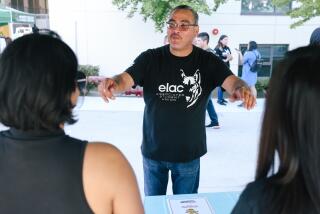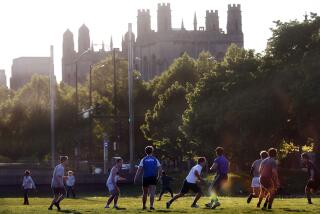University to Require Students to Take Online Courses
- Share via
TEANECK, N.J. — It sounds like a college student’s dream--a university requiring students not to come to class.
Starting next year, new students at Fairleigh Dickinson University will be required to take at least one course a year online. It’s believed to be a first for a college or university.
“We believe it’s a transforming learning tool,” said J. Michael Adams, president of the 9,000-student university. “If we are preparing global citizens, we believe that our graduates must be facile with the Internet.”
The university’s Academic Senate, a faculty group, approved the requirement last month. Next fall, members of the freshman class will choose from 12 to 15 courses in English literature, global issues and even one about the Internet itself, said Michael Sperling, the university’s interim dean.
FDU currently offers 35 online courses, although not all are offered every semester. About 160 students, many of whom are not on campus, are currently enrolled, Sperling said.
In four years, as successive classes become subject to the online course requirement, the university will develop 50 to 60 new courses, he said. The school will spend about $5 million to develop new software and upgrade its network.
Other Institutions May Follow Lead
A spokesman for a nonprofit group that represents 1,750 university technology officers said he knows of no other university that has required its resident undergraduates to take an online course, but he said he wasn’t surprised.
“Others will probably be doing this too,” said Bob Burdick, spokesman for Boulder, Colo.-based EDUCAUSE. “The assumption is that students will increasingly demand this kind of service because it offers them a tremendous capability to structure their own time.”
A report released earlier this year by Market Data Retrieval, a Dun & Bradstreet educational research company, stated that seven in 10 colleges now offer some form of online learning, including courses, lecture notes and online study groups. During the 1999-2000 academic year, a third of the nation’s two- and four-year colleges offered degrees via computer, more than double that of a year earlier.
At Fairleigh Dickinson, graduate students can obtain a complete online master’s degree in electrical engineering, and a certificate program is available in management information systems. No other degrees can be obtained completely online.
But Burdick said distance learning courses do not appeal to all students and have not translated well in all topics. Technical, mathematical courses seem to be best suited to the Internet, with specific outcomes and expectations, he said. And students who benefit more from close contact with a teacher may not fare as well.
Not being able to talk to a professor after class and not having the peer learning experience that students get inside a classroom could be drawbacks, Burdick said.
“There’s a real social need that’s filled by students getting together with their professors on campus,” he said.
University officials, who will train faculty members to teach on the Internet, said students can still schedule meetings with professors, and some classes will make chat rooms available at specific times to bring the students together.
“Distance learning, when it’s done right, can be as effective as classroom instruction,” Adams said. “It is neither better nor worse. It is just different.”
On the Net:
FDU: https://www.fdu.edu
EDUCAUSE: https://www.educause.edu
More to Read
Sign up for Essential California
The most important California stories and recommendations in your inbox every morning.
You may occasionally receive promotional content from the Los Angeles Times.













